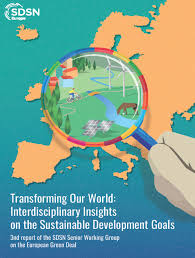“`html
The Importance of Sustainable Development
Sustainable development is a concept that emphasizes meeting the needs of the present without compromising the ability of future generations to meet their own needs. It involves finding a balance between economic growth, social progress, and environmental protection.
One of the key aspects of sustainable development is environmental sustainability. This includes conserving natural resources, reducing pollution, and mitigating climate change. By taking care of our environment, we ensure that ecosystems remain healthy and can continue to support life on Earth.
Economic sustainability is another crucial component. Sustainable development aims to promote economic growth that is inclusive and equitable. This means creating opportunities for all members of society to benefit from economic progress, while also ensuring that resources are used efficiently and responsibly.
Social sustainability focuses on improving quality of life for all people. This includes addressing issues such as poverty, inequality, education, healthcare, and social justice. Sustainable development seeks to create societies where everyone has access to basic needs and opportunities for personal growth.
By embracing sustainable development practices, we can build a better future for ourselves and future generations. It requires cooperation among governments, businesses, communities, and individuals to make responsible choices that consider the long-term impact on the planet and its inhabitants.
Ultimately, sustainable development is about creating a world where people can thrive in harmony with nature. It offers a vision of progress that is not only sustainable but also just and inclusive for all. By working together towards this goal, we can ensure a brighter tomorrow for all living beings on Earth.
“`
Key Aspects and Goals of Sustainable Development: Answering Common Questions
- What are the 4 major components of sustainable development?
- What are 4 types of sustainable development?
- What are the 5 principles of sustainable development?
- What are the 3 main focuses of sustainable development?
- What is the main goal of sustainable development?
What are the 4 major components of sustainable development?
When discussing sustainable development, it is important to understand the four major components that form its foundation. The first component is environmental sustainability, which involves preserving natural resources, reducing pollution, and protecting ecosystems. Economic sustainability is another key component, focusing on promoting inclusive economic growth and efficient resource use. Social sustainability addresses issues such as poverty alleviation, social equity, and access to basic services like healthcare and education. Lastly, institutional sustainability plays a crucial role in ensuring effective governance structures and policies that support sustainable development goals. By integrating these four components harmoniously, sustainable development can be achieved for the benefit of current and future generations.
What are 4 types of sustainable development?
In the context of sustainable development, there are four main types that encompass different aspects of sustainability: environmental sustainability, economic sustainability, social sustainability, and cultural sustainability. Environmental sustainability focuses on preserving natural resources and ecosystems for future generations. Economic sustainability aims to promote growth that is both prosperous and equitable, ensuring that economic benefits are shared among all members of society. Social sustainability addresses issues such as social equity, community well-being, and access to basic services like healthcare and education. Cultural sustainability involves preserving heritage, traditions, and diversity within communities to maintain their unique identities while progressing towards a sustainable future. Each type plays a crucial role in achieving holistic and long-lasting sustainable development outcomes.
What are the 5 principles of sustainable development?
In the context of sustainable development, the five key principles that guide decision-making and actions are often referred to as the pillars of sustainability. These principles include social equity, economic efficiency, environmental protection, intergenerational responsibility, and stakeholder participation. Social equity emphasizes fair distribution of resources and opportunities among all members of society. Economic efficiency focuses on using resources wisely to promote long-term prosperity without depleting natural assets. Environmental protection highlights the importance of preserving ecosystems and minimizing negative impacts on the environment. Intergenerational responsibility recognizes the need to consider future generations in current decision-making processes. Stakeholder participation underscores the importance of involving diverse groups in shaping sustainable development initiatives for collective benefit and success. By adhering to these principles, sustainable development can be achieved in a holistic and balanced manner that benefits both present and future generations.
What are the 3 main focuses of sustainable development?
In the realm of sustainable development, the three main focuses revolve around environmental sustainability, economic sustainability, and social sustainability. Environmental sustainability entails preserving natural resources, reducing pollution, and combatting climate change to ensure the health of ecosystems for future generations. Economic sustainability aims to foster inclusive and equitable economic growth by utilizing resources efficiently and creating opportunities for all members of society to benefit from progress. Social sustainability is centered on improving quality of life by addressing issues like poverty, inequality, healthcare access, education, and social justice to create a society where everyone has the chance to thrive. These three pillars form the foundation of sustainable development efforts worldwide.
What is the main goal of sustainable development?
The main goal of sustainable development is to meet the needs of the present generation without compromising the ability of future generations to meet their own needs. It aims to achieve a balance between economic growth, social progress, and environmental protection to ensure a more equitable and sustainable future for all. By promoting responsible resource management, reducing inequality, and preserving ecosystems, sustainable development seeks to create a world where people can thrive in harmony with the environment while safeguarding the well-being of future generations.

